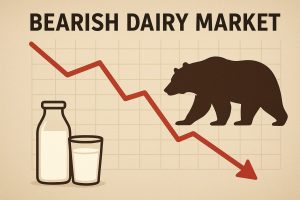
Goldman Sachs, for example, recently cut its estimate for China’s 2023 gross domestic product (GDP) from 5.3 percent to 4.5 percent. This year’s GDP for China is forecast at 4.4 percent, well below the country’s 5.5. percent target.
“For now, China remains married to its zero Covid strategy, which has resulted in sweeping lockdowns in major metropolitan centers, and that has blunted economic recovery,” said Monica Ganley, analyst with the Daily Dairy Report and principal of Quarterra, an agricultural consulting firm in Buenos Aries. “China’s weakening economy along with suspected large stockpiles of milk powders will likely continue to slow dairy imports.”
China’s dairy imports remained weak in August across most categories, according to data from Trade Data Monitor. Year-over-year milk powder imports have fallen every month since February in China, and August was no exception. However, the drop was most severe for whole milk powder (WMP), most of which is sourced from New Zealand.
WMP imports fell 59.5% to 66 million pounds compared to the same month last year. Skim milk powder (SMP) imports dropped a more modest 2.4% but climbed 20.4% compared to the prior month. Imports of fluid milk and cream and cheese were also down by 40.1% and 10%, respectively, compared to the prior year.
However, not all of China’s dairy imports declined in August. The country imported 138.5 million pounds of whey, a 1.2-percent jump over August 2021 purchases. The gain was the first year-over-year increase since September 2021, Ganley noted, and it likely reflected a recovery in China’s pork sector.
“As pork producer margins have improved and the pig herd has grown, demand for feed ingredients such as dry sweet whey and permeate have risen,” she said. “The growth has been a particular boon for U.S. suppliers, who have captured an increasing share of this market.”
China’s imports of fat rose as well, with butter and anhydrous milkfat increasing 32% and 8.8%, respectively. Infant formula imports also climbed, up 23.1% year over year.
“In addition to China’s slowing recovery, analysts believe the country’s dairy product stocks have grown over the past few years, a belief that has been reinforced by weak whole milk powder imports,” Ganley said. “Thus, it appears likely that demand for dairy products in China will remain precarious in coming months.






















